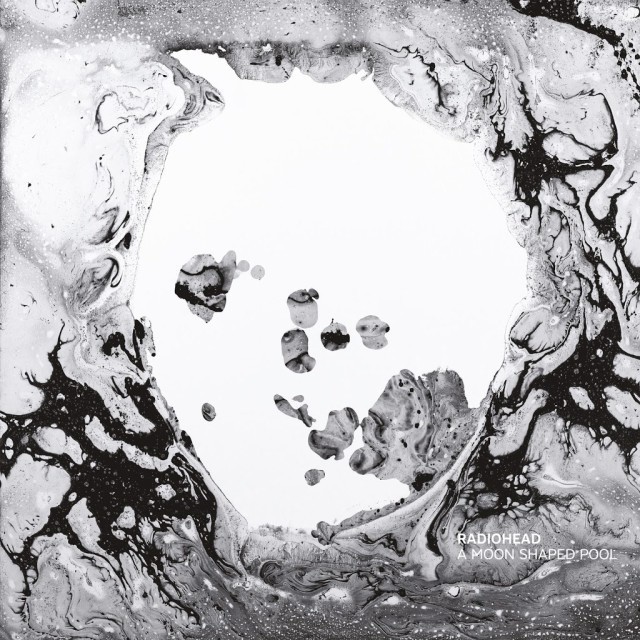From cryptic clues to teaching us how to disappear from the internet completely, to announcing a new release just a few days before it hit cyberspace, the band still have the motivation to test their audiences with calculated chess moves. Yet the content within Radiohead‘s ninth album A Moon Shaped Pool is a balance of welcoming familiarity and measured surprise tactics. Apart from Thom Yorke’s lamenting vocal presence being a guarantee, thought-provoking mood-setting soundscapes being very likely and themes of paranoia, alienation and cautious suspicion about society being a given, the album features an array of songs that die-hard fans will already be accustomed to.
Among them, ‘Desert Island Disk’ was performed at a conference in early December, ‘Present Tense’ debuted at 2009’s Latitude Festival, the title ‘Burn The Witch’ appeared on the CD sleeve of 2002’s Hail To The Thief and was spawned from there, whilst ‘Ful Stop’ and ‘Identikit’ were previewed on a tour in 2012. However, the oldest inclusion is the delicate ballad ‘True Love Waits’. Originally borne in 1995 and becoming a fan favourite during their shows, it takes on a whole new meaning 20 years later, due to Thom Yorke’s break-up with his long-term partner at the end of last year, the singer ending the song – and album – with a desperate plea of “don’t leave.”
There could be a problem with cohesion by collating songs written in different eras, but since OK Computer, Radiohead have created a sound that – in a good way – is stylistically organised and allied. Like the ominous tragedy surrounding School of Seven Bells‘ SVIIB and David Bowie‘s Blackstar, there’s an added incentive of working out how the lyrics can reflect the time now as opposed to when they were penned; an intriguing listen, whether it’s matching the prose to Yorke’s pouring heartbreak as he finds ways to distract himself from the pain (‘Ful Stop’, ‘Present Tense’) or social commentary on modern day issues. Reading into it further, it’s possible to propose that by ordering the tracks alphabetically, this is their way of holding onto some kind of control amongst the disorder of life and love.
The intense ‘Burn The Witch’ seems to suggest an antisocial blame culture (which can now apply to refugees and finger-pointing Islam) growing stronger through the social media that Radiohead abandoned for a short while. Furthermore, ‘The Numbers’ and ‘Tinker Tailor Soldier Rich Man Beggar Man Thief’ could be about global warming with lyrics about nature and the future, and fish praying for their survival. There’s plenty of room for guesswork and interpretation but what is certain is that the new production of the hidden songs are planned to detail. ‘Daydreaming’ duplicates Yorke’s vocals in a similar ghostly fashion to Everything In It’s Right Place and ends with the unravelling of a sleeping beast snoring. The psychedelic favourite of back-masking is also utilised on ‘The Numbers’ along with distant laughing reminiscent of Erlend Oye‘s ‘Every Party Has A Winner…’
Although art rockers Radiohead are championed for their use of electronic sound (like ‘Tinker Tailor’s sandbag hitting and their time signature shuffling on ‘Ful Stop’) and inventive use of stereo space such as on ‘Decks Dark’, one of the most standout attributes of A Moon Shaped Pool is the stringed orchestration provided by the London Contemporary Orchestra and its trajectory of fluttering and soaring, and how it continues on from the grandiose sound of Radiohead’s ignored Spectre theme. Like with that, there was a mix of familiarity and surprise, a technique that they can call their own.




